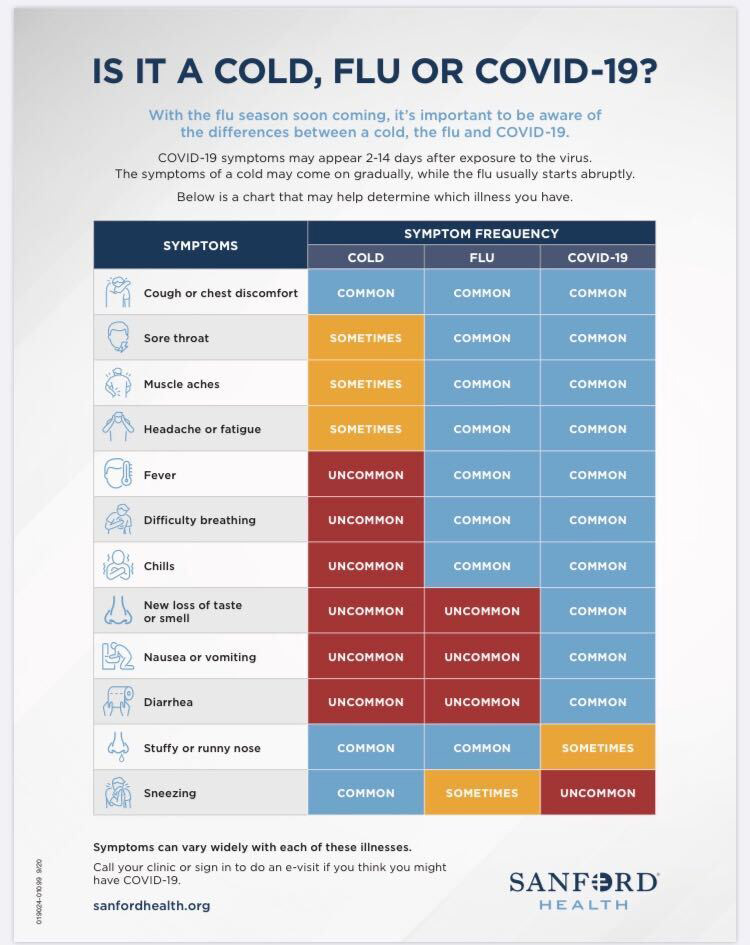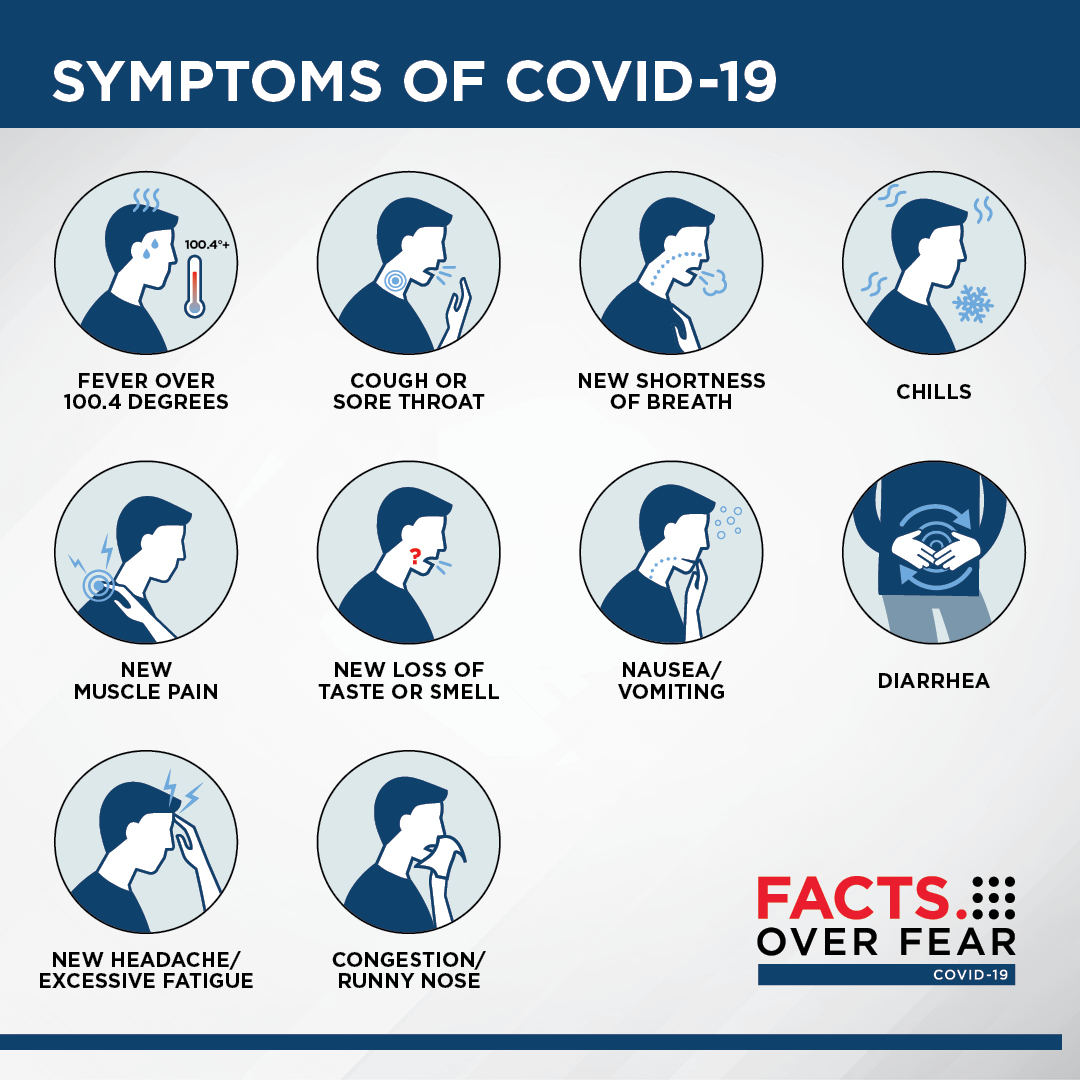The most common symptoms of COVID-19 are fever, cough and shortness of breath.
The Centers for Disease Control and Prevention’s list of COVID-19 symptoms has grown to include nasal congestion and excessive fatigue. Symptoms of the novel coronavirus are now:
- Fever higher than 100.4 degrees
- Chills
- Sore throat
- Cough
- New shortness of breath
- New loss of taste or smell
- New muscle pain
- Nausea
- Vomiting
- Diarrhea
- New headache
- New nasal congestion
- Excessive fatigue
As anyone who has ever suffered through allergies, a common cold or a flu can tell you, some of those conditions share traits with COVID-19.
So how can you tell the difference whether you’re suffering from allergies or just getting sick with a cold — or carrying the virus that is part of a pandemic?
No. 1, according to the World Health Organization, symptoms of the virus do not normally match up exactly with those of a common cold.
Enlarge

Infographic by Sanford Health
Allergies vs COVID-19
In regard to allergies, while they can cause a cough, they do not cause a fever or a sore throat.
And COVID-19 is not connected with the itchy eyes, itchy nose and sneezing typically associated with allergies.
“It’s very important that every single person on the planet knows what signs and symptoms of COVID-19 are,” said Dr. Maria Van Kerkhove, an infectious diseases epidemiologist with the WHO. “The symptoms of COVID-19 are not sneezing and having a runny nose.”
Colds vs COVID-19
Differentiating among a cold, allergies, influenza and COVID-19 is important for everyday people. It’s also vital for clinicians trying to manage the spread of the virus.
“The initial symptoms can be very similar with a fever, a cough and shortness of breath,” said Dr. Allison Suttle, Sanford Health chief medical officer, during a live Facebook question-and-answer session on March 15. “That’s where things start to differentiate. The difference with influenza is that we have a vaccine. We also have treatment — Tamiflu can be helpful, depending on the year.”
The potential severity of the illness is also increased with COVID-19 in comparison to influenza. People who are at increased risk for severe illness from COVID-19 include older adults and people with certain underlying medical conditions.
Flu vs COVID-19
“It can be hard to tell as a clinician if you’re dealing with a patient with influenza or the coronavirus,” Dr. Suttle said. “Oftentimes we will rule out influenza — it’s a quick test we can do right away at the clinic.”
After crossing off influenza, the provider will ask questions to determine whether you need a COVID-19 test.
Effective Sept. 22, COVID-19 screening questions for Sanford Health employees and patients include symptoms of nasal congestion and excessive fatigue. These updates align with recent changes made by the CDC.
Sanford Health also prioritizes testing for hospitalized patients with COVID-19 symptoms, older adults, and people of any age with underlying medical conditions that put them at risk for severe illness from COVID-19.
What should I do if I have symptoms?
If you are experiencing fever or cough, or if you feel you might have COVID-19, do not go to work and do not travel. In some cases, immediate attention may be needed.
Emergency warning signs: Call 911
- Trouble breathing
- Persistent pain or pressure in the chest
- New confusion
- Inability to wake or stay awake
- Bluish lips or face
Call 911 or call ahead to your local emergency facility. Notify the operator that you are seeking care for someone who has or may have COVID-19.
For current Sanford patients: Schedule an e-visit
- Log in to My Sanford Chart to request an e-visit.
- Select your reason for an e-visit and follow the prompts.
- Submit your request for an e-visit and a Sanford physician will respond to you within four hours through My Sanford Chart.
For current Sanford patients, another option: Call your doctor’s office
When you call your doctor’s office, they will ask you three screening questions:
- Do you have a fever, chills, sore throat, cough, new onset of shortness of breath, new onset of loss of taste and smell, new onset of muscle pain, nausea, vomiting, diarrhea, headache, fatigue; or have a pending COVID-19 test because you were having any of those symptoms?
- Do you have a pending COVID-19 test without any of the symptoms previously mentioned?
- In the last 14 days, have you been exposed to anyone with a lab confirmed COVID-19 test or have you had a COVID-19 positive result?
For the health and safety of our patients and employees please do not go directly to your clinic.
If you are new to Sanford Health
If you are not a current patient and you are concerned you might have COVID-19, call My Sanford Nurse.
A Sanford Health nurse will ask you the screening questions above about symptoms, whether you have a pending COVID-19 test or have been exposed to anyone with a confirmed COVID-19 test.
For the latest COVID-19 recommendations from Sanford Health providers, visit sanfordhealth.org.
Learn more
- COVID-19 FAQ: How often do you need a COVID shot?
- COVID long-hauler still recovering one year after diagnosis
- COVID, RSV, flu and whooping cough vaccines available now
…
Posted In COVID-19, Flu, Frequently Asked Questions
